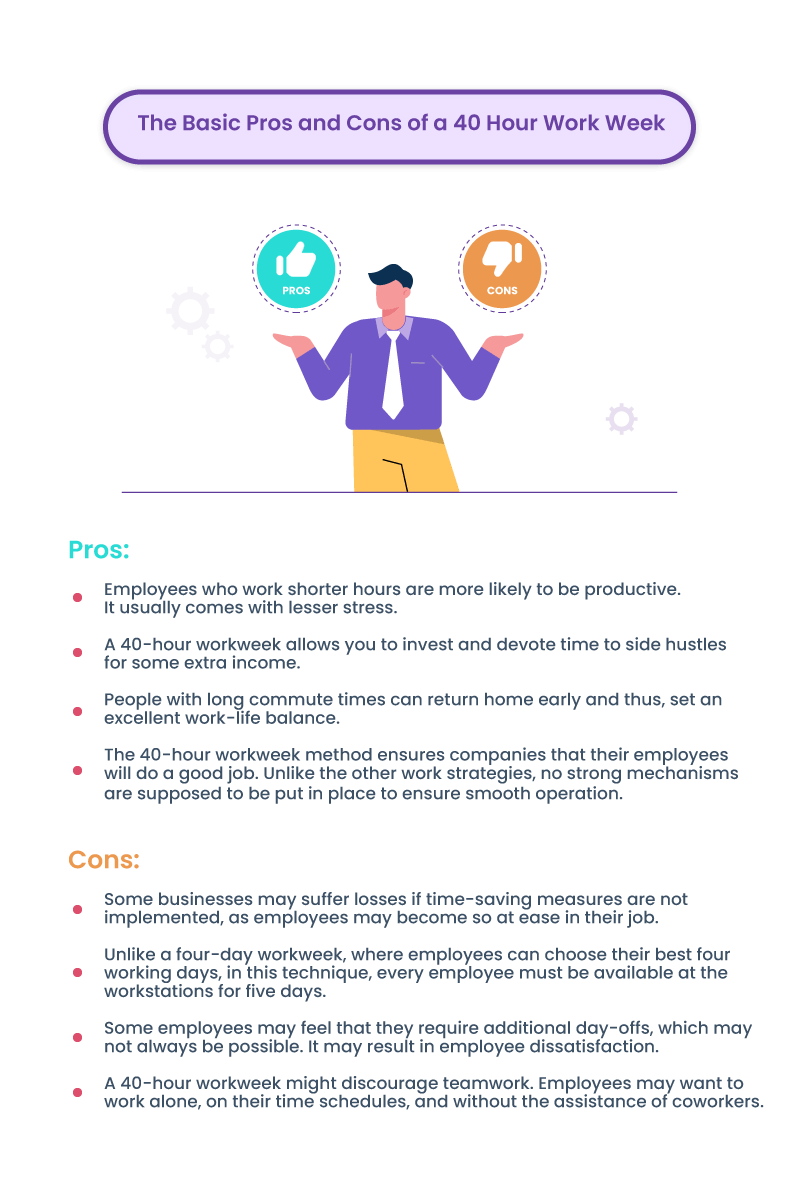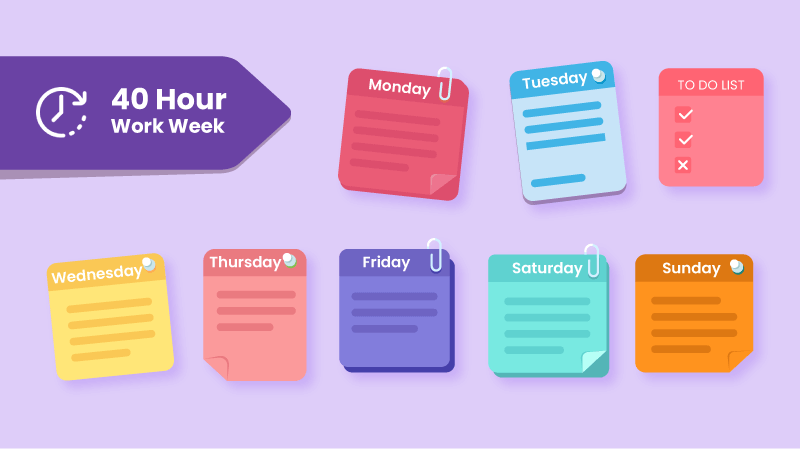Revisiting The Famous 40 Hour Work Week
What is the ideal number of hours you should work every week? Is a 40 hour work week considered normal? Why is it so prevalent in businesses? And what does science have to say about it?
According to experts, the debate over how many hours an ideal workday should have resurfaced. New studies are being conducted, and the results appear to be quite interesting. If the 40 hour work week is slowly going redundant; the question is, what will replace it?
Before moving on, let's start with a quick rundown of the 40 hour work week’s history.
The History Of The 40 Hour Work Week
1817
Workers came together this year to demand better working conditions and hours. It's worth noting that, back then, they put in 70 to 100 hours every week at their workplace.
1866
The National Labor Union requested Congress to enact legislation requiring an eight-hour workday. Even though they did not pass the bill, it boosted huge support for the reform.
1869
President Ulysses S. Grant signed a proclamation requiring government employees to work eight-hour days. Grant's judgment inspired workers in the private sector to demand the same rights.
1886
The Illinois Legislature passed a law requiring eight-hour workdays this year. Many companies refused to participate, resulting in a large labor walkout in Chicago when a bomb killed 12 people. The Haymarket Riot was the result, and it is now observed as a public holiday in many countries on May 1.
1926
After research, Henry Ford popularised the 40 hour work week. He discovered that working more only resulted in a lesser improvement in productivity.
1938
There was an enactment of revolutionary law. Congress passed the Fair Labor Standards Act. It mandated that all employees are working more than 44 hours per week be paid overtime. Two years later, they changed the law to make the work week 40 hours long.
1940
The 40 hour work week eventually became law in the US.
How Effective Are 40 Hour Work Weeks?
There's no one size that fits all.
Each person is unique, with various life stressors and talents, making it difficult to establish a set of efficient working hours.
However, we can observe that most companies and full-time employees resort to eight-hour workdays, five days per week. Does this, however, imply that a 40 hour work week is ideal?
According to Christopher Barnes, an associate professor at the University of Washington, there is no good answer to this question.
In an 8-hour workday, the average worker is productive for around three hours a day.
Most employees aren't working for the majority of the time at work, according to a study of over 2,000 full-time office workers.
It says that employees generally spend-
- 1 hour and 5 minutes in reading news websites.
- 44 minutes on social media.
- 40 minutes on a non-work related conversation with coworkers.
- 26 minutes in looking for a new job.
- 23 minutes for smoking breaks18 minutes in making phone calls to friends or partners.
- 17 minutes while making hot drinks14 minutes in texting or instant messaging.
- 8 minutes in snacking.
- 7 minutes on food preparation at the office.
Now let's look at this survey data of 1,000 people who work at or own small and medium-sized businesses initiated by Zapier.
- A minority of people (29%) say they devote 4-5 hours per day to their core functions.
- A frightening 18% stated they spend barely an hour or so per day on those core job functions.
- 81% of employees say they spend less than 3 hours per day on creative work, while 76% say they spend less than 3 hours per week on strategic work.
- 90% of employees check work chat apps for up to 5 hours every day.
These figures suggest that the average worker is far from being 100 percent productive in a 40 hour work week. However, for certain organizations, the 40 hour work weeks are working great.
A Case Study In Support Of 40 Hour Work Week
Perpetual Guardian
"We need to get more companies to give it a go. They will be surprised at the improvement in their company, their staff, and in their wider community."
Perpetual Guardian is possibly one of the most important case studies to understand the four-day work week impact.
- A test conducted by the New Zealand-based financial services firm resulted in a 20% improvement in productivity after introducing a 40 hour work week.
- Employees' stress levels decreased by 7%, while work-life balance scores improved from 54% to 78%.
- Employees used the extra day to pursue hobbies, while others spent it with their parents, studying, or in household chores. It also aided in increasing profits and employee wellbeing.
When Is The 40 Hour Work Week Not Practical?
In some industries, such as construction, a reduced work week is not feasible.
Even when their employees are incredibly motivated and engaged at work, their tasks take time to complete. In some instances, a reduced work week may require employees to work overtime to complete the necessary amount of labor.
Working overtime eliminates any potential benefits of a shortened work week for your employees. Furthermore, your company will have to pay far more in overtime compensation to achieve the same level of value.
Now, let's know these-

How To Craft The Perfect 40 Hour Work Week For Full Efficiency?
Start each work week with a plan
To have an optimal work week, particular plans and strategies must be in place. It usually takes time, but people are often so preoccupied with their jobs that they don't take the time to assess if they're doing the job as needed. So, you'll need a clear plan for how to spend your 40 hours if you want to make the most of them.
You may conduct a broader planning and strategizing session on Friday afternoon to set the schedule for the following week. Also, you can update the next day's agenda for a few minutes at the end of each day.
Stephen Tang, president and CEO of Philadelphia's University City Science Center, says he advises people to "take 30 minutes at the end of the workday to close up your desk, close your screen, decompress, reflect, journal, become self-aware about what went right and what went wrong, and then tee up the next day before you go home."
Dedicate more hours to core production
The work value of what you're being paid to do is core production. You'll need to spend more hours on core production and be strategic with the 40 hour work week plan.
In 20 to 25 hours, a mid-career person may complete a lot of core work. Plan them out so that you can accomplish your best job while you're at your most productive time (8 a.m to noon for most people). You must avoid distractions at all costs.
Make time for creative activities
Our key sources of economic development are knowledge and ideas. In this Knowledge Age, it's all about coming up with new ideas, new ways of doing things, redefining the ballgame, and responding to demand in more innovative ways.
It's about using collective intelligence systems to transform thoughts into a valuable learning and accomplish things. All of these can be done in a productive 40 hour work week.
Build workplace relationship
If you work at least 40 hours a week, chances are you spend more time each week with your coworkers than with your friends and family.
In an ideal 40 hour work week, it's worth it to cultivate solid working connections. We can devote around 2.5 hours to developing workplace relationships with an accountability group, people you usually work with, or your vendors.
Work on external networking
Any act that creates strong personal ties with other people is referred to as networking. It's a vital activity–some might call it a necessary evil–for improving your profession or, if you're an entrepreneur, for getting new business and meeting investors.
You must create many opportunities to network in a variety of micro-ways during the course of a typical workday. Infact, every tweet, post, message, and comment is an opportunity to connect. You can also be a part of media interviews. You may reconnect with former coworkers, create industry articles, or attend networking events.
Productivity expert and author of The Together Teacher, Maia Heyck-Merlin, says that one of her influence-building hours is dedicated to "giving back. " She regularly schedules career chats or field advice requests from others.
Keep track of every single work you do at work
It isn't easy to reflect on whether you're acting in ways that align with your plans without first becoming aware of how you are currently spending your time.
Keeping a time log is a great way to find your starting point, your base level." Chris Bailey says in his book The Productivity Project.
Keeping track of your time and duties will assist you in determining your baseline. If you see some time gaps on Wednesdays and Thursdays, for example, use these times to brainstorm ideas for the next project. That means you'll be able to set SMART goals and establish plans.
Four Best Alternatives To The 40 Hour Work Week
1. Flextime
You can provide employees the option of choosing when they start and finish their workday, provided they are present in the official meeting and activities.
Read our blog on: Flexible Working Hours: 5 Ways It Boosts Productivity
2. Telework
Often known as telecommuting, telework is one of the most sought-after options these days for those who don't want to work a regular 40 hour week. Employees can work one to five days a week from home or anywhere remote.
Read our blog on: 7 Telecommuting Rules Leaders Must Follow
3. Compressed work week
Working four ten-hour shifts per week rather than five eight-hour shifts can result in a compressed work week. It offers the extra benefit of saving the employee income by lowering their commuting costs.
4. 32 hour work week
The 32 hour work week is designed to allow people to work four days a week for eight hours each day while still earning their full salary. Making 32 hour work weeks the norm rather than 40 hour work weeks can boost employee wellbeing along with business productivity.
Related blog: The Four Day Work Week Might be the Future
Conclusion- Is The 40 Hour Work Week Now Obsolete?
It's time for a new work revolution. With the 40 hour work week becoming obsolete, it's time to think about working fewer hours and getting more done for a happier and more productive workplace.
People began working and seeing work differently amid COVID-19 lockdown. Many employees worked from home, and some companies provided flexible working hours to accommodate child care and other obligations.
This pandemic also revealed several workplace inequalities that have been in place for generations. Most of us have spent our entire lives working a 40 hour week, so it's tough to imagine a better way. But, many people are now reconsidering their working hours.
According to studies, reduced working hours help not just workers but also employers and society as a whole.
All in all, it's time for change and reducing work hours is a good start. In the coming days, we must also upgrade our economic and labor systems in other ways, such as increasing minimum wages, vacation time, parental leave, benefits, and work-life flexibility.


















